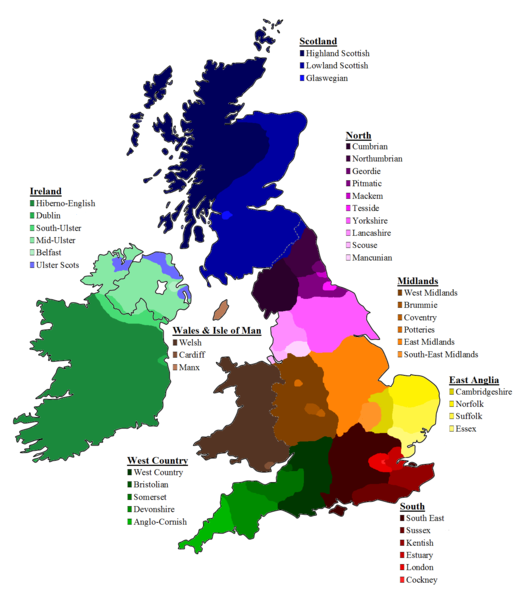Now the two Victorian London accents I, most likely, just insensitively appropriated and horribly butchered were of the Costermongers and London’s Cadgers (beggars). While reading around Lee Jackson’s Victorian London Dictionary, in the Words & Expressions tab, I stumbled into a short piece about the different English accents just within the city of London itself. Everything from the metropolitan elite, to the poor, or to the (actual) meat butchers themselves have surprisingly distinguished manners of pronunciation, granted, just within the radius of a city.

Accents and dialects of a particular language can vary greatly, especially if the dominant language covers a significant amount of territory. As seen in the map above, each section of Great Britain is known for a regional dialect and within those regions, are broken down into even more varying accents of that region. If you thought this was much, Jackson’s article breaks down the different accents of just the city of London, which is that little bright red area in south east England, during its Victorian period.
If you had been of “London’s exquisite“, you might have found yourself talking about going to the “Opewa- aw – or else of wunning down – aw – to the Waces-aw-aw” meanwhile, your “Metropolitan Miss” may have been talking about how she “loves the ble-ue ske-i, and her bootie little doggie and birdie, and delights in being key-ind to the poor, and thinks Miss So-and-so looked ‘sweetly pretty’ at church in her new bonnet.”
That’s also just London’s elite. Had you been unfortunate as to be a part of London’s poor (which many were), your conversations may have sounded more like this:
‘S’pose now, your honour,’ said a ‘shallow cove’, who was giving us a lesson in the St. Giles’ classics, ‘I wanted to ask a codger to come and have a glass of rum with me, and smoke a pipe of baccer over a game of cards with some blokes at home—I should say, Splodger, will you have a Jack-surpass of finger-and-thumb, and blow your yard of tripe of nosey-me-knacker, while we have a touch of the broads with some other heaps of coke at my drum?
Now if that hasn’t overtaxed your brain attempting to sound these last few accents out, try your hand (or rather your mouth) at coster-slang, or the slang used by London’s costermongers.
Costermongers is just another way or Victorian Londoners to describe a person who was a “street seller”. These group of people had prided themselves on a way of speaking that seemed completely incoherent to even people from London. So the next time you might hear “it’s the esilop!”, you best be running away if you were just previously engaged in any illegal activity. To clear things up a bit, coster-slang (also called back-slang) is merely pronouncing each word as it would be spelled backwards. Therefore, “kool the esilop” would mean, “look the police” and “it’s on doog” is “it’s no good.”
Here’s a little conversation that would happen in butcher back-slang that clears up why might this seemingly nonsensical way of speaking had persisted during 19th century London (from weloveaccents) :

Butcher’s Backslang
Butcher: Good morning madam, what can I get for you today?
Customer: I’ll take a pound of beef steak and make it quick.
Butcher (to his assistant): Go and tuck the dee-lo woc a tib of nettor es-roh.
Butcher (to the customer): I’ve just sent him into the back to get you the best bit.
Butcher’s assistant: The nettor es-roh is on doog even for the dee-lo woc so I’ll get tucking a tib of dee-lo woc.
Butcher: Ee-nif tub I’ll ee-gratch the ee-mass as for the doog tucks.
And here’s a translation of what these two butchers are saying.
Translation
Butcher: Good morning madam, what can I get for you today?
Customer: I’ll take a pound of beef steak and make it quick.
Butcher (to his assistant): Go and cut the old cow a bit of rotten horse.
Butcher (to the customer): I’ve just sent him into the back to get you the best bit.
Butcher’s assistant: The rotten horse is no good even for the old cow so I’ll get cutting a bit of old cow.
Butcher: Fine but I’ll charge the same as for the good cuts.
So that’s what they were up to.
This pig-latin like way of speaking is a nice example of how dialects or accents are used to establish out-group and in-group individuals and keeping out-group people in the dark, when it proves advantageous. In conclusion, the next-time you find yourself in a situation where you encounter the rare individual who happens knows coster-slang, you should most certainly ask if he or she would like “to do a pot of reeb”.